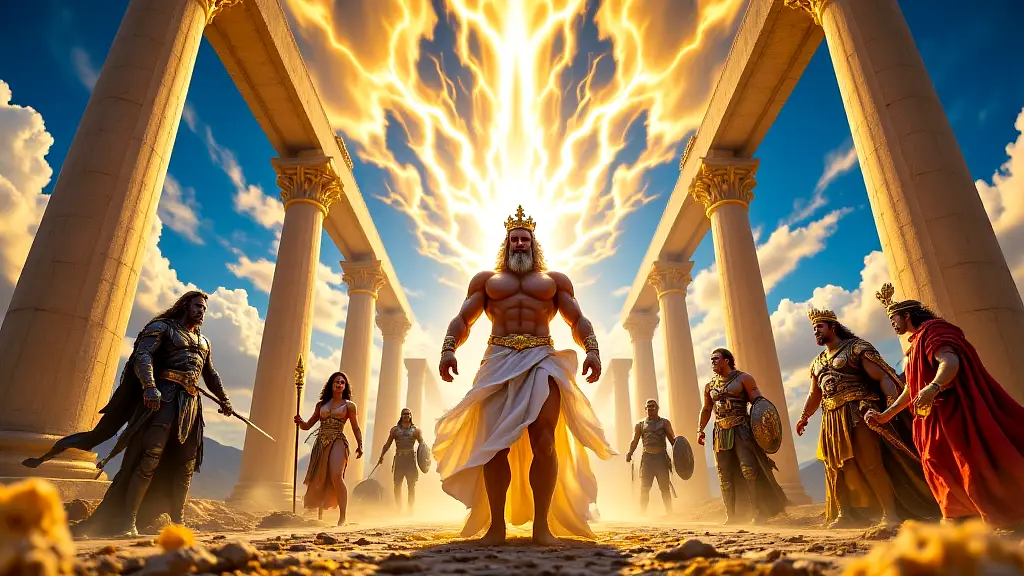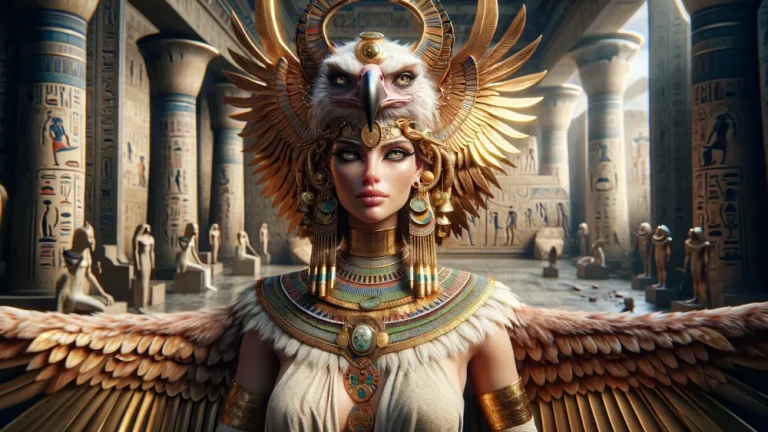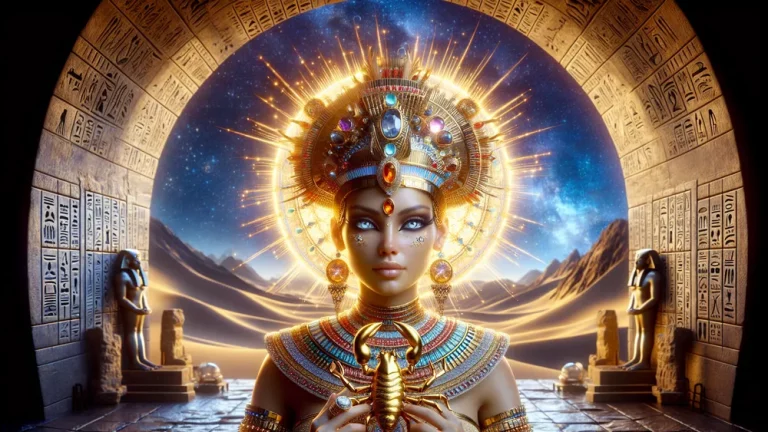The Most Powerful Greek Gods And Their Unmatched Abilities
Picture a storm strong enough to split the sky. Zeus could unleash lightning powerful enough to flatten mountains. This was the power of Greek gods – beings that shaped the world through wars, prophecies, and pure determination. In this guide, you’ll learn how the ancient Greeks measured divine power. Zeus ruled the sky, while Athena won battles with strategy instead of brute force.
Key Points:
- Zeus was the strongest, ruling the sky with lightning and leading the gods against the Titans.
- Poseidon controlled the sea and earthquakes, using his trident to flood lands or calm storms.
- Hades ruled the Underworld fairly, with a helmet that made him invisible and power over the dead.
- Athena won battles with smart plans, not just strength, and helped heroes like Odysseus.
- Apollo could bring plagues or healing, and his prophecies at Delphi guided cities and people.
- Even powerful gods had flaws—Zeus couldn’t resist love affairs, and Athena got angry when challenged.
- Greek gods were stronger than Norse ones because they ruled unchallenged, while Norse gods faced limits and doom.
Olympus worked like a divine empire. Zeus ruled as king, Poseidon governed the seas, and Hades controlled the underworld. Each god had a domain, but even they couldn’t escape fate, which the Moirai controlled. Divine power wasn’t just about strength. It also came from worship, myths, and even their weaknesses. Whether you’re new to mythology or revisiting it, we’ll explore these stories together.
You’ll see the Titanomachy’s massive battles and how Zeus compared to Odin in Norse myths – without spoiling the details in later sections.
Most Powerful Greek Gods: Overview and Key Facts
| God/Goddess | Domain | Symbols and Tools | Power Scale (1-10) | Notable Myth |
|---|---|---|---|---|
| Zeus | Sky, Thunder, Kingship | Lightning bolt, Eagle, Aegis | 10/10 | Led the gods to victory against the Titans and later crushed Typhon with lightning. |
| Poseidon | Sea, Earthquakes, Horses | Trident, Dolphin, Horse | 9/10 | In anger, he flooded Attica and sent storms to torment Odysseus. |
| Hades | Underworld, Dead, Wealth | Helm of Darkness (invisibility), Cerberus | 8/10 | He abducted Persephone and governed the Underworld firmly but justly. |
| Athena | Wisdom, Strategy, Warfare | Owl, Aegis, Spear | 9/10 | She sprang fully formed from Zeus’s head, later aiding Odysseus and defeating Ares in the Trojan War. |
| Apollo | Sun, Prophecy, Healing, Plagues | Lyre, Bow, Laurel Wreath | 8/10 | He controlled the Oracle at Delphi and could bring plague or healing, as seen in the Iliad. |
| Hera | Marriage, Women, Childbirth | Peacock, Diadem, Scepter | 7/10 | She relentlessly punished Zeus’s lovers, including Heracles. |
| Hephaestus | Fire, Blacksmithing, Craftsmanship | Hammer, Anvil, Tongs | 6/10 | He crafted Zeus’s lightning bolts and was responsible for Pandora’s creation. |
| Ares | War, Violence, Bloodshed | Spear, Vulture, Dog | 5/10 | Athena frequently bested him in battle, as he represented raw violence rather than tactics. |
| Artemis | Hunt, Wilderness, Moon | Bow, Deer, Crescent Moon | 7/10 | When Actaeon saw her bathing, she transformed him into a stag. She was also Apollo’s twin. |
| Hermes | Travel, Trade, Thieves, Messengers | Caduceus, Winged Sandals | 6/10 | He led souls to the Underworld and was known for tricks, like stealing Apollo’s cattle. |
(Note: Some myths have variations – for example, Athena’s birth is sometimes linked to Metis, Zeus’s first wife, in other versions.)
What Power Meant in Greek Mythology
In their view, a god’s power went beyond physical strength, combining authority, control over fate, and respect from worshippers. Here’s how the Greeks understood it.
How the Greeks Measured Divine Power
The ancient Greeks measured a god’s power through three main factors: control over nature, worship by mortals, and role in myths. Consider Zeus – his control over lightning showed his supreme authority as ruler of gods and mortals. Poseidon’s power to cause earthquakes and storms wasn’t just destructive; sailors across the Mediterranean both feared and respected him for this power.
Human devotion also mattered greatly – gods like Athena, who held influence through major temples in Athens and Sparta, were vital to cities for both war and peace.
Here’s how the Greeks evaluated divine power:
- Control Over Nature
- Worship and Followers
- Mythological Importance
(Note: Some gods’ roles differed by region – Artemis was mainly a huntress but worshipped as a fertility goddess in Ephesus.)
The Greeks saw a god’s power in how they ruled nature, how much people worshipped them, and how big their role was in stories.
The Part Fate and the Moirai Played
The most powerful Greek gods had to obey the Moirai – three sisters who controlled the course of every life. They represented the fundamental rules of destiny. Even Zeus feared certain prophecies, like one about being overthrown by his son, which led him to swallow Metis. In the Iliad, Achilles‘ short but famous life was determined when he chose war over safety. No one could change the Fates’ decisions, which determined both tragic and successful outcomes:
- Zeus’s Fear: He swallowed Metis to prevent being overthrown (Theogony), though some stories say he later made deals with the Fates.
- Achilles’s Decision: His mother Thetis warned he would die young if he fought at Troy (Iliad 9.410-416), but he chose glory over a long life.
- Oedipus’s Story: His attempt to avoid his fate (killing his father) actually made it happen, proving mortals couldn’t escape destiny.
(Note: A few rare stories tell of exceptions, like Apollo convincing the Fates to postpone Admetus’s death – but even then, the final outcome didn’t change.)
The 5 Strongest Greek Gods
We’ve covered how the Greeks defined divine power and its limitations. Now here are the Olympians who were considered most powerful.
Zeus: Ruler of the Gods and Master of Thunder
Zeus didn’t inherit his position – he took it by force. Born to Rhea and Cronus, he avoided being eaten like his siblings by hiding in Crete. When grown, he tricked Cronus into vomiting his brothers and sisters, then led them in the Titanomachy, a ten-year war against the Titans. With lightning bolts made by Cyclopes and help from hundred-handed giants, Zeus defeated the Titans and imprisoned them in Tartarus.
His lightning was incredibly powerful, which he used against his enemies. Zeus wasn’t only a military leader. As god of the sky, he controlled the weather, bringing rain to reward good behavior or storms to punish arrogance. An eagle served as his messenger, and his decisions, such as punishing Prometheus for stealing fire, showed his authority.
However, he had limitations – prophecies about being overthrown, like his father before him, made him cautious.
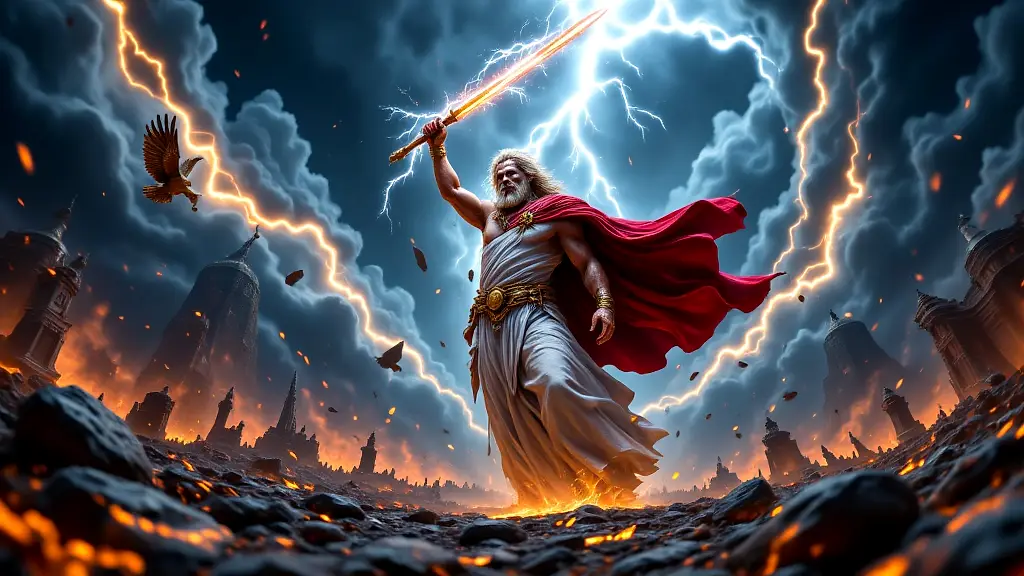
Here’s how his power compares:
| Aspect | Details |
|---|---|
| Domain | Sky, thunder, justice, kingship |
| Power Scale | 10/10 (Supreme Olympian) |
| Key Enemies | Titans, Typhon (giant storm serpent) |
| Symbols | Lightning bolt, eagle, oak tree, aegis |
(Note: Some myths say Metis, Zeus’s first wife, helped him defeat Cronus – but he later swallowed her to prevent a prophecy.)
Poseidon: Sea Lord and Earthshaker
Poseidon’s trident was more than a weapon – it gave him complete control over the Mediterranean Sea. With one strike, he could create massive waves or make the water calm, which made sailors pray to him in fear. His title “Earthshaker” was accurate: when angry, such as after losing Athens to Athena’s olive tree, he would flood entire areas.
Consider Odysseus’s story – Poseidon’s lasting anger over his son Polyphemus being blinded turned a short trip into a long struggle, showing how even great heroes were at his mercy. However, Poseidon wasn’t only harmful. He made springs appear, like the saltwater one in Athens, and some stories say he created the first horse to win Demeter’s favor.
But those who angered him faced storms or creatures like the Cretan Bull, which he sent to punish Minos. His power changed like the sea – useful for commerce but dangerous if provoked. (Note: Some local religions worshipped Poseidon primarily as a horse god, showing how his myths varied by region.)
Hades: The Hidden King of the Underworld
Hades wasn’t evil in Greek myths – he was the administrator of the afterlife. His invisibility helmet, made by Cyclopes, helped him move unseen during the Titanomachy. While Zeus controlled the sky, Hades ruled the dead with strict fairness. He managed the underworld fairly – only punishing those who earned it, like Sisyphus, while maintaining the separation of living and dead.
The story of Persephone shows complexity: some versions say Zeus approved their union, and her yearly returns created the seasons. Today people often describe Hades as devil-like, but ancient Greeks viewed him as serious rather than wicked. He seldom left his domain, and when he did – such as visiting Epidaurus to heal – it was for practical reasons.
His name means “The Unseen,” referring both to his helmet and how Greeks avoided direct talk about death. Unlike unpredictable gods, Hades represented order – ensuring the dead remained below so life could flourish above. (Note: Orphic traditions show a kinder Hades, who permitted Orpheus to request Eurydice’s return.)
Athena: Wisdom and War’s Clever Strategist
Athena was born fully armed from Zeus’s forehead, which matched her important role in myths. While gods like Ares enjoyed disorder, Athena fought with careful calculation. During the Trojan War, she didn’t just assist heroes – she outsmarted entire armies. When Odysseus needed to escape the Cyclops or when he passed the Sirens, Athena used her intelligence rather than strength to help him.
Even her olive tree gift to Athens showed clever thinking, since it provided food, oil, and wood, which helped the city thrive for generations. She had a special ability to use intelligence to win. Many believe she invented the Trojan Horse. In the story with Arachne, she turned the weaver’s arrogance into a warning for others.
While Poseidon caused earthquakes and Zeus threw lightning, Athena’s careful thinking made her the most skilled planner among the gods. She didn’t just help win fights – she ensured Greek heroes succeeded in entire wars. (Note: Some local religious groups focused more on Athena’s war aspects than her wisdom.)
Athena used smart plans instead of brute force to help heroes win battles and outthink enemies.
Apollo: God of Prophecy and Plagues
Apollo’s arrows brought either healing or death, both with perfect accuracy. When Agamemnon took Chryses’ daughter in the Iliad, Apollo sent a plague on the Greek army, showing that even kings had to respect his anger. Yet this same god governed places of healing like Delos, where people prayed to “Apollo the Physician.”
His most famous ability was prophecy, centered at Delphi. There, the Pythia breathed gases from the earth to speak his prophecies. Cities asked for prophecies before wars, while people came for important decisions, establishing Apollo as a crucial source of divine guidance.
Key Symbols:
- Lyre: Won from Hermes in a trade, which symbolized arts and harmony.
- Bow: Used as both weapon and protection, like when he defended Olympus from Python.
- Laurel Wreath: Came from his failed chase of Daphne, later worn by winners.
(Note: Some local religions focused more on Apollo’s connection to the sun, eventually blending him with Helios.)
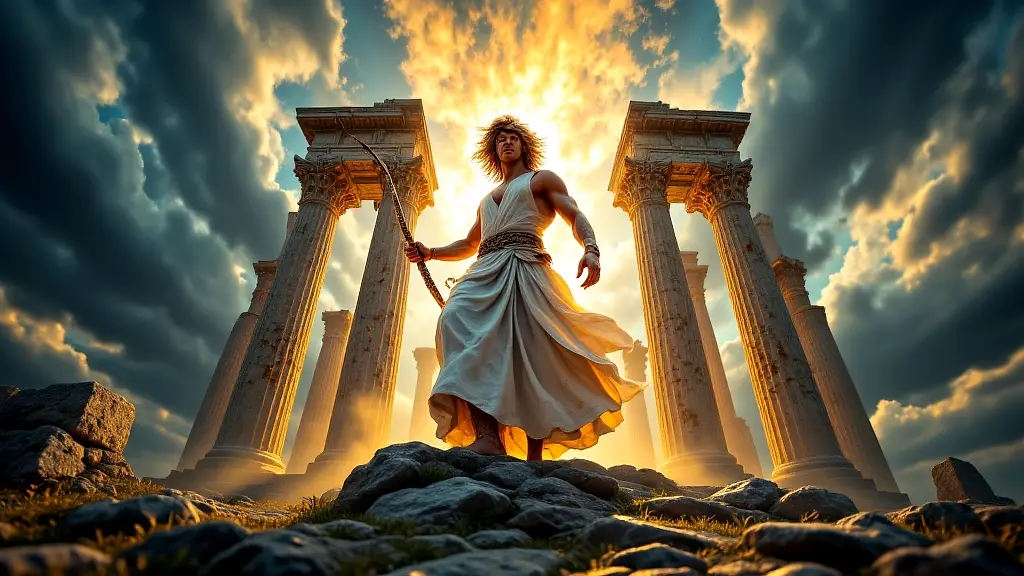
Underrated but Powerful Gods
Zeus and Apollo were widely worshipped, but other gods had just as much power though less known.
Hecate: Witchcraft and Crossroads’ Guardian
Hecate could travel between Olympus, earth, and the Underworld, which even Zeus allowed. When Persephone returned from Hades, Hecate’s torches lit their way, which confirmed her role as a guide of souls. Witches called on her for magic, travelers left gifts at crossroads shrines, and her triple form – which often appeared back-to-back – kept watch in all worlds.

The Greeks saw her as more than a magic goddess. They believed she made people hear voices at night and gave plants their special properties. (Note: Some local cults combined her with Artemis or Selene, making her origins unclear.)
Hephaestus: Olympus’s Gifted Blacksmith
Hephaestus’s forge created the gods’ strongest weapons, including Zeus’s lightning bolts, Athena’s shield, and the chains that held Prometheus. Though thrown off Olympus twice – first by Hera, then by Zeus – his disability didn’t stop him. He built golden robots that walked for him and made a throne which captured Hera to get back at her. His marriage to Aphrodite seemed strange since she was the love goddess.
But Hephaestus tricked her and Ares with a net no one could escape, showing his intelligence was more valuable than their beauty. (Note: Some stories say Hera created him alone, jealous that Zeus had Athena by himself.)
Even Gods Had Flaws
Despite being powerful, gods such as Hecate and Hephaestus had their own flaws. This was similar to the more powerful Olympians they served.
The Weaknesses No God Could Escape
The Greek gods weren’t perfect – their godly powers had big weaknesses. Zeus couldn’t control his desires, which caused many problems. His relationship with Alcmene led to Heracles’ birth, and Hera later made the hero’s life difficult. Poseidon’s pride flooded entire cities when offended, while Apollo’s arrogance made him curse mortals.
He sent the plague in the Iliad and skinned Marsyas alive for opposing him. Even Athena, the wisdom goddess, turned Arachne into a spider for challenging her skills.
These weren’t just minor flaws. They had serious consequences:
- Zeus’s Lust: Relationship with Alcmene → Heracles’ labors
- Poseidon’s Pride: Flooded Attica after losing Athens to Athena
- Apollo’s Arrogance: Cursed Cassandra for rejecting him (Agamemnon‘s tragedy)
- Athena’s Anger: Turned Medusa into a Gorgon in some stories for violating her temple
(Note: Different myths tell different versions – Hesiod and Ovid disagree about Medusa’s origin.)
Greek vs. Norse Gods: Who Was Stronger?
So how would these imperfect Greek gods compare to another famous divine family? Let’s see how they stack up against the Norse gods of Asgard.
Zeus vs. Odin: Battle of the Kings
Zeus maintained strict rule over Olympus. His lightning bolt served as both a royal symbol and weapon, which he used to defeat the Titans (Theogony) and other challengers. Odin, however, ruled Asgard through magic and knowledge, having given up an eye to gain wisdom (Prose Edda). Zeus was all about power, while Odin focused on victory in wars rather than just battles.
Odin set up Ragnarök’s events, whereas Zeus typically responded to predictions.
| Attribute | Zeus (Greek) | Odin (Norse) |
|---|---|---|
| Domain | Sky, Thunder, Justice | War, Wisdom, Poetry |
| Symbol | Lightning Bolt | Gungnir (spear) |
| Key Battle | Titanomachy | Ragnarök |
| Leadership | Direct, strict | Cunning, strategic |
(Note: Some Eddic poems show Odin as both wise and hard to judge – his motives aren’t always clear.)
Zeus ruled with raw power and his lightning bolt, while Odin relied on wisdom and planning for war.
Fate in Greek and Norse Myths
In Greek myths, the Moirai (Fates) controlled everyone’s fate completely. Not even Zeus could change this, as shown when his son Sarpedon died at Troy (Iliad). But in Norse myths, wyrd worked differently. The Norns wove it at Urðarbrunnr (Prose Edda), yet gods like Odin could influence parts of it, like when he collected warriors for Ragnarök.
While Oedipus’s fate was decided before he was born, Norse stories show that decisions had weight – at least until everything played out completely. (Note: Some Eddic poems, like Völuspá, suggest wyrd was still unavoidable, just not as strictly set as Greek fate.)
Epic Godly Battles
Even though fate controlled what happened to the gods, their biggest conflicts used lightning weapons, spears, and clever tactics. We’ll look at these important battles.
The Titanomachy: When Gods Fought Titans
The Titanomachy lasted ten years. During this war, Zeus and his brothers and sisters fought against Cronus and the Titans to rule the universe. After escaping his father, Zeus gathered the Olympians, while the Cyclopes made his famous lightning bolts (Theogony). With Hades’ helmet that made him invisible and Poseidon’s trident, the Olympians changed the outcome. Some accounts claim the hundred-handed Hecatoncheires joined them earlier (Bibliotheca).
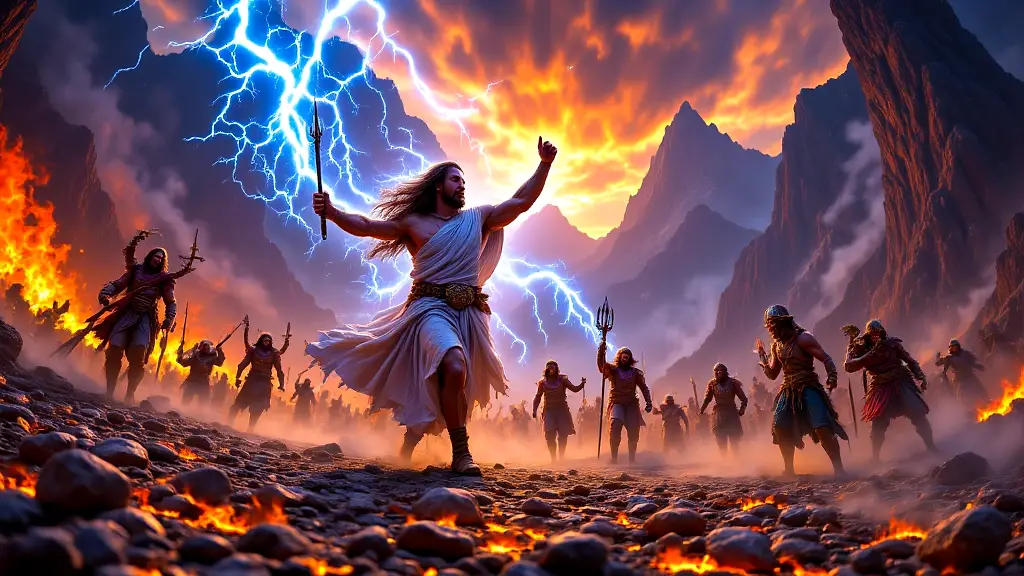
This was more than a simple battle. The combatants threw mountains at each other, and the ground trembled when the gods fought the ancient powers. The Cyclopes’ help proved crucial: Zeus used his lightning bolts to defeat Titans like Atlas, who was forced to hold up the sky. When it ended, the losing Titans were sent to Tartarus, a place even deeper than Hades.
Zeus won and the Olympians took control, although some texts like the Homeric Hymns mention that some mortals still favored the Titans. It was similar to a government overthrow: violent, needed, and never completely erased from memory.
Athena vs. Ares: Brains vs. Brutality
During the Trojan War in the Iliad, Athena and Ares represented different approaches to war. Ares rushed into fights without thinking, whereas Athena carefully planned winning strategies. When Ares, who loved combat, fought for the Trojans, Athena helped the Greeks. She guided the hero Diomedes‘ spear to hit Ares in the side (Iliad 5.855).
Ares’ loud cry of pain was heard across the battlefield as he retreated to Olympus, greatly embarrassed. Some artworks, like the François Vase, show Athena fighting Ares directly. However, Homer’s version focuses on her smart tactics instead of physical strength. This shows that Athena‘s careful planning worked better than Ares‘ reliance on pure strength.
FAQs
1. Why are Greek gods considered more powerful than Norse ones?
Greek gods are considered more powerful than Norse ones because they ruled absolute, unchallenged domains (e.g., Zeus’s sky, Hades’ underworld), while Norse gods faced mortal-like limitations and predestined destruction.
2. Could Zeus defeat Odin in a battle?
Zeus could defeat Odin in a battle due to his unrivaled mastery over lightning and absolute authority as king of the Greek gods.
3. Which Greek god had the most unique ability?
The most unique ability belonged to Hades, who wielded absolute dominion over the Underworld, a realm inaccessible to other Olympians.
4. Did any mortal ever overpower a Greek god?
A mortal overpowering a Greek god did occur in myths, such as Diomedes wounding Ares with Athena’s aid during the Trojan War.

